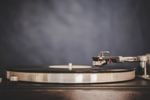
How do the experiences of listening to music differ between CDs and Record Players?
, by Haim Deutsch, 5 min reading time

, by Haim Deutsch, 5 min reading time
Comparing CDs to vinyl or record player records is like comparing digital photography to film photography in terms of music.
Both CDs and record players are rotating-disc-based audio storage and playback devices that date to various periods in the history of music.
While analogue record players use a needle to physically read the audio, CD audio is digitally encoded and read by a laser.
Since CDs are digital recordings, the audio is first converted to a digital format before being written to the disc.
Since audio is not converted to a digital format before being engraved into a record player, record players are analogue recordings.
Of course, there are other important differences between CDs and record players as well.
The order and reading of the music on a CD versus a vinyl record are the two main differences between them.
With CDs, music is digitally encoded directly onto the disc, making it possible for CD players to read and playback the digital music that is stored there.
Compact discs (CDs) are the most effective and portable option because they can be played on speakers that have a CD insert or on portable CD players.
When compared, vinyl records aren't nearly as effective or handy.
However, they offer a listening experience that CDs' digital recordings simply cannot match.
A record player's fine needle can read the analogue sound storage used by a record player recording.
These records consist of a polyvinyl chloride disc with an engraved spiral groove that makes it simple for the needle to read and play the music.

Pro-Ject Debut Carbon Evo Turntable
Digital CD audio quality is unquestionably superior to record player audio quality from a technical perspective.
Better stereo channel separation, a higher signal-to-noise ratio, and constant playback speed are all advantages of CDs.
No matter how exact the sampling, the breakdown of music into binary data can never compare to the slick and continuous nature of analogue vinyl, which is the basis for the arguments against digital audio.
If you look closely enough, a million tiny square pixels can never create a perfect curve in a picture.
The record player has a growing reputation for a warmer, more lifelike sound, despite its undeniable susceptibility to physical interference and noise.
Although this is technically refuted by high sample rates combined with anti-aliasing, the technical arguments for it typically focus on the inherent jaggedness of digital sampling.
However, many beginners and professional musicians continue to make the subjective claim that an overall "better" sound exists.
There will be no end to the battle between analogue and digital sound among audiophiles.
While retro enthusiasts and purists will argue that record player has a cleaner, better sound, their modern counterparts trust in technology's precision.
The fact that CD audio is distorted because the sample rate can't keep up with all of the organic components from the original recording will help to clarify this point.
This is not to say that digital files sound bad by any means because they work well with contemporary sound systems.
However, from the perspective of an audiophile, digital files will never compare to the experience that vinyl records provide, which is why they frequently favour vinyl.
When listening to vinyl records, the soundwaves produced by the analogue recording are replicated in each groove etched into the record.
Record players are able to capture every detail from the original sound because the grooves are essentially a mirror of those soundwaves.
You won't lose any of the unique instrumentation and sonics used in the production this way.
Additionally, because record players produce analogue audio, you can still connect them to a speaker system without actually converting the audio.
For each music lover, CDs and record players have different qualities, benefits, and drawbacks.
Although the way in which audio is consumed will continue to change, vinyl still has unique advantages.
In the same breath, CDs are highly sought-after because you can take them anywhere thanks to their efficiency and portability.
The more effective and flexible form of audio will always be digital audio. But a record player collection provides a level of accuracy that digital recording formats can't possibly match.
Here is our collection of the best-selling Record Players starting only from £269.00
In conclusion, comparing CDs to vinyl or record player records is similar to comparing digital photography to film photography in terms of music.
While CDs and record players are both rotating-disc-based audio storage and playback devices, they differ in terms of the method of audio encoding and reading. CDs are digital recordings, whereas record players are analogue recordings that use a needle to physically read the audio.
While CDs offer better technical sound quality due to a higher signal-to-noise ratio and constant playback speed, record players provide a warmer and more lifelike sound that captures every detail from the original sound.
Ultimately, the choice between CDs and record players depends on personal preferences and the desired listening experience. While digital audio is more effective and portable, record players offer a level of accuracy that digital recording formats just cannot match.
For more details on our Record Players please visit us here.